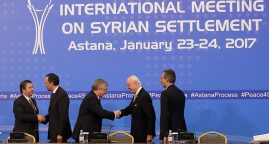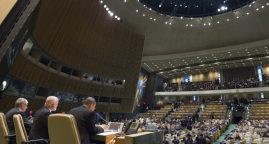The final desperate plan
Every week, Jean-Marie Colombani, co founder and director of Slate.fr, expressed freely and subjectively his views on the highlights news.
The plan adopted by the 28 member states of the European Union, intended to control the flow of refugees from Syria, may be, for the EU, one of the last chance. This device was the subject of an agreement with Turkey. It pledged to hold refugees on its soil, and failing to accept back those who, having reached Greece, will be returned (850,000 persons increased from Turkey to Greece in 2015). Turkey gets in return 6.6 billion euros in principle to finance the reception of some 2.7 million refugees it already shelters. It also gets the promise of visa liberalization. Finally accepted the principle that the Union is committed to welcoming people eligible asylum, currently in refugee camps in Turkey.
This agreement raises several questions and difficulties. It first performs a simple idea: to master the movements, perceived by much of European opinion as a threat, and objectively difficult to absorb in a relatively short time, switch off the cause of the Syrian conflict (of where diplomatic and military efforts) and encourage neighboring countries to hold refugees on their soil. This explains the key position of Turkey. And intransigence which strongly seems a blackmail of a president, Recep Erdogan, increasingly dictatorial.
The most serious questions are asked by humanitarian organizations and the UN as international law prohibits collective renewed and requires individual consideration for those who claim asylum. From the beginning of the crisis, the European Commission proposed that are created in Greece and Italy, the main host countries, “hot spots”, that is to say the centers for recording and migrants identify genuine refugees. This device is just starting to fall into place. We are witnessing a race between implementing collective mechanisms and the pressure of crowds who want to find refuge in Europe. Greece asked the reinforcement at least 25 000 European officers to run the “hot spots”.
The agreement of Turkey with the 28, is however, a small positive step for Europe. Just because unanimity was made while previous plans had been rejected by most EU countries from the Soviet bloc (Poland, Hungary, Czech Republic, Baltic countries), revealing a cultural break (the countries of Western Europe have a greater diversity of practice). It also reveals a contradiction in the east of the European construction: an economic zone for some (tremendously aided by the Structural Funds), a community of values for the founding countries.
This is the second great upheaval which the European Union. It took four years to devise and implement solidarity mechanisms that have helped to overcome the international financial crisis. Four years to raise the German reticence. This time, Germany has taken the lead in opening their arms to refugees and supporting the first plans of the Commission which provided for the allocation to each country, according to its possibilities, firstly refugees. These mechanisms have encountered the refusal of the East European countries as well as that of a significant part of the German public, as just the latest polls show. Hence the collective message now: it is no longer open the doors but to close. History shows, however, that if a road survival closes, another opens often …
Translated from French
Read the article in French on Direct Matin Website
Related Articles
Call for new solidarity in the Mediterranean and Euro-Arab world
05/18/2016. Buoyed by the FDMEA this call is a preamble to the drafting of a white paper.
Russia leaves Syria talks with tentative plan. Up next: get US involved
01/24/2017. Russia, Iran, and Turkey agreed to sketch the outlines of a wider political settlement to Syria’s civil war.
At summit for refugees and migrants, senior UN officials underline the importance of collective action
09/10/2016. At summit for refugees and migrants, senior UN officials underline the importance of collective action



